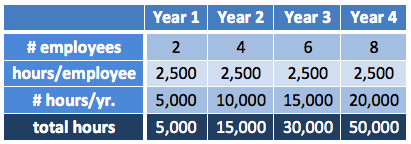1 in 10,000 is far less than 1%…
Using the norm of doling out the unrestricted shares across four years, let’s compute the total effort spent to build the company in those forty-eight months.
Fifty hours per week is not uncommon at startups. At fifty weeks per year, that is 2,500 hours per person per year or 5,000 hours total for two co-founders.
Typically, however, a successful company will grow each year. For simplicity, let’s say it grows by two people per year. That then is 5,000 additional hours each year, totaling 50,000 hours across the four years.

I find this computation important, as too many co-founders and early employees expect to be granted 50% or 25% or 10% of the total equity. What this computation shows is that, given 50,000 hours of effort to create a successful company, 10% of that total effort takes a single person two years of full-time employment.
This calculation demonstrates that a co-founder working for four years will put in a total of 10,000 hours of effort, which is just one-fifth or 20% of the total effort.
And do note that this calculation is based on a company with just eight employees by the fourth year. Most of the companies you read about in the news with big “exits” have dozens or hundreds of employees, increasing the total effort to millions of hours.
Given this calculation, what is all the effort to date worth? In reality, for most startups, only a few hundred or a few thousand hours go into the initial business planning before reaching the point where the founders talk about splitting the equity. Thus, in reality, all that effort is truly worth less than one or two percent of the total equity pool.
However, most people find that reality unbelievable and insist on much larger percentages. My suggestion is to be overly generous, setting aside as much as 10% of the equity for the effort to date. That will make all the equity holders happier, and the few extra percentage points will likely make little difference later on.
RULE 8:
The effort to-date is truly worth only 1%-2%. But since few people believe that truth, be overly generous.
One way to recognize the effort already put into the company is to include some unrestricted shares as part of a founder or employees grant. To do this, the grant is written as, “N shares, K% unrestricted, the remainder removing the restriction in equal increments over 48 months.”
If this concept works for your team, then first determine everyone’s equity split. Next, allocate a percentage of the shares to be unrestricted. Or, if it is easier, agree on percentages for each of the tasks completed to date and assign those percentages to whoever did the work.
Neither of these options is simple or easy, and both should lead to the same general compensation values. That is they both allow people to get compensated for some of the work already completed, regardless of whether they end up staying with the company in the future.










